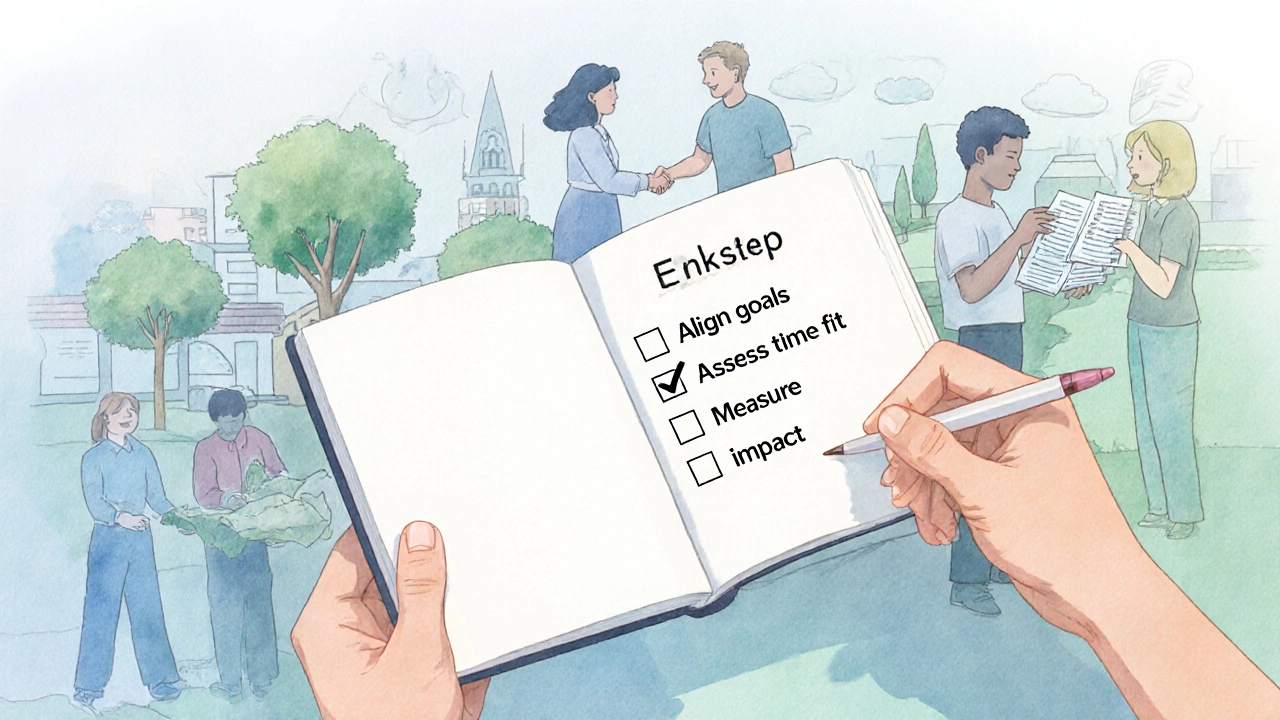Is Volunteering Worth the Time? Benefits, Costs, and Real‑World Impact
 Oct, 14 2025
Oct, 14 2025
Volunteer Impact Calculator
How much is your time worth?
This calculator helps you determine if your volunteering commitment delivers meaningful benefits relative to the time you invest.
Key Takeaways
- Volunteering can boost mental health, skill sets, and career prospects while strengthening community ties.
- The time you invest matters, but even short, regular commitments often deliver measurable benefits.
- Choose roles that match your goals-whether you seek personal fulfillment, professional networking, or direct impact.
- Track your contributions to see tangible outcomes and keep motivation high.
- Potential drawbacks like burnout are real; set boundaries and pick realistic schedules.
When you hear the question “Is volunteering worth the time it takes?” you’re really weighing personal gain against the effort you’ll spend. The answer isn’t one‑size‑fits‑all, but by breaking down the benefits, costs, and practical tips, you can decide if the trade‑off makes sense for you.
Volunteering is a unpaid, purposeful activity that helps nonprofit organizations or community groups while providing personal and professional growth opportunities. It ranges from a few hours a month at a local food bank to year‑long commitments with international NGOs. Below we explore why that time can be a win‑win, what to watch out for, and how to design a volunteering schedule that fits your life.
Why People Volunteer: The Core Motivations
Understanding why you’re drawn to help makes it easier to pick the right role. Common motivators include:
- Desire to give back to the Community the group of people you live among, share resources with, and affect through local actions.
- Building Skill development the acquisition or sharpening of abilities like project management, fundraising, or public speaking.
- Improving Mental health overall psychological well‑being, often through a sense of purpose and social connection.
- Enhancing Career prospects future job opportunities, networking, and résumé building.
- Expanding Social capital the network of relationships and trust that can be leveraged for personal or professional benefit.
Measurable Benefits of Volunteering
Research from the University of Exeter (2023) shows that volunteers report a 20% increase in life satisfaction after six months of regular activity. Below is a quick snapshot of the most cited gains:
| Benefit Category | Personal Impact | Organizational Impact |
|---|---|---|
| Skill Acquisition | New competencies (e.g., event planning) | Higher quality program delivery |
| Networking | Access to mentors & peers | Broader donor and volunteer base |
| Well‑Being | Reduced stress, purpose‑driven routine | Higher staff morale through community support |
| Civic Identity | Stronger sense of belonging | Increased public trust and legitimacy |

How Much Time Is Needed?
There's no magic number, but a few guidelines help you set realistic expectations:
- Micro‑volunteering: 1‑2hours a week for tasks like social‑media posting or data entry. Ideal for busy professionals.
- Regular commitment: 4‑6hours per month, typically the sweet spot for community projects, tutoring, or event assistance.
- Long‑term roles: 10‑15hours a month, often required for leadership positions, board membership, or specialized services (e.g., medical volunteering).
The key is consistency. A study by the UK Charity Commission (2022) found volunteers who logged at least 3hours a month reported a 15% higher sense of achievement than those who only showed up sporadically.
Choosing the Right Opportunity
Not every volunteer role fits every personality or schedule. Ask yourself these questions before signing up:
- What am I hoping to gain? (Skill, network, personal fulfillment)
- How much time can I reliably dedicate?
- Do I prefer hands‑on work, virtual tasks, or a mix?
- Which Nonprofit organization a group that operates for charitable, educational, or social purposes without profit distribution aligns with my values?
Once you have answers, browse local platforms like Scotland’s Volunteer Scotland, national sites like Do-it.org, or specific cause‑based portals (e.g., environmental clean‑ups, youth mentorship).
Potential Drawbacks and How to Mitigate Them
Volunteering isn’t a free‑ride; you might experience burnout, schedule clashes, or feel your impact is minimal. Here’s how to keep the experience positive:
- Set clear boundaries. Limit your commitment to a realistic weekly or monthly quota.
- Track outcomes. Use a simple spreadsheet to note hours, tasks, and any feedback. Seeing progress fuels motivation.
- Communicate regularly. Let the organization know if your availability changes; most groups appreciate transparency.
- Seek variety. Rotate tasks or join short‑term projects to avoid monotony.

Real‑World Stories: When Volunteering Pays Off
Emma, 28, Edinburgh worked as a junior graphic designer. She volunteered two evenings a month with a local arts charity, creating event flyers. Within a year, she added “non‑profit design” to her portfolio, landed a freelance contract, and reported a 30% boost in confidence.
Ravi, 45, Manchester started a weekly mentorship program for under‑privileged teens. The role required 4hours weekly. Over three years, he helped 12 students secure apprenticeships, and he himself earned a promotion at his corporate job for demonstrated leadership.
Both cases illustrate how a modest time investment can translate into tangible personal and community gains.
Putting It All Together: A Simple Decision Framework
Use the three‑step checklist below to decide whether a volunteer opportunity is worth your time:
- Align goals. Match the role’s outcomes with your personal objectives (skill, network, fulfilment).
- Assess time fit. Verify that the commitment fits your existing schedule without overloading.
- Measure impact. Choose organizations that provide clear feedback on volunteer contributions.
If the answer is “yes” for all three, you’re likely on a path where volunteering feels rewarding rather than burdensome.
Frequently Asked Questions
How many hours per week should I volunteer to see real benefits?
Even 1‑2hours a week can create noticeable personal gains if the tasks are purposeful. For skill‑building, aim for 4‑6hours monthly; leadership roles often need 10‑15hours.
Can volunteering really boost my career?
Yes. Volunteering provides real‑world experience, expands your network, and can fill résumé gaps. Many employers value community involvement as evidence of soft skills like teamwork and initiative.
What if I feel overwhelmed or burnt out?
Set clearer boundaries, reduce hours, or switch to a different type of task. Communicate with the organization; most are flexible and can adjust your role.
How can I track the impact of my volunteering?
Log hours, note specific outcomes (e.g., meals served, people mentored), and request feedback reports from the organization. Many charities issue annual impact statements that include volunteer metrics.
Is virtual volunteering as valuable as in‑person work?
Virtual roles can be just as impactful, especially for tasks like digital marketing, tutoring, or grant writing. The key is clear deliverables and regular communication.
